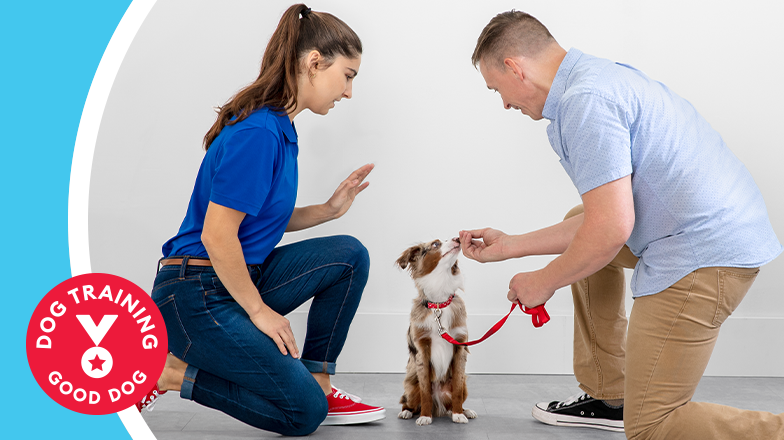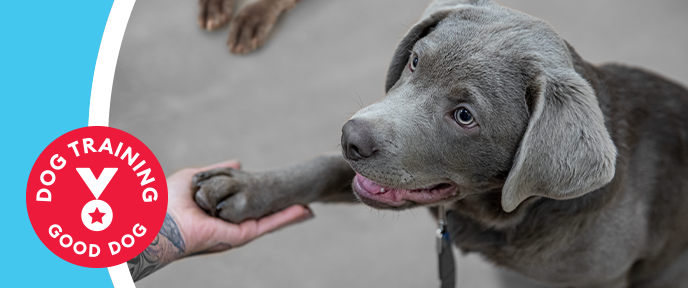Dog Training Near Me: Understanding Canine Behavior Like a Pro
Efficient Approaches for Successful Canine Training: A Comprehensive Overview
Efficient pet dog training needs a nuanced understanding of canine actions. It depends upon the principles of favorable support and consistency. Trainers have to recognize the value of vital commands and socialization. Resolving common behavioral problems can change a pet dog's disposition. As the bond in between owner and pet strengthens, the method they interact evolves. The trip of successful training encompasses numerous techniques that may shock also seasoned pet dog proprietors. What are the essential aspects that can make a considerable distinction?
Recognizing Canine Actions
Comprehending canine habits is vital for reliable pet dog training, as it permits fitness instructors to analyze a pet's actions and responses in various circumstances. Pets communicate mostly via body language, vocalizations, and facial expressions. Acknowledging indications of anxiety, hostility, or stress can assist trainers readjust their strategies to guarantee a positive training experience. A wagging tail does not constantly indicate happiness; the context and other body hints have to be taken into consideration.
In addition, comprehending a pet's breed-specific traits can provide understandings into their actions patterns and reactions. Socialization plays an essential duty in shaping a dog's feedbacks to brand-new people and atmospheres. Observing a dog's play style can also expose their personality and comfort degrees. By very carefully examining these behaviors, fitness instructors can create customized strategies that foster learning and reinforce the bond in between pet and proprietor, inevitably leading to even more successful training outcomes.
The Relevance of Favorable Support
Positive support is a crucial technique in dog training that improves the finding out process by satisfying preferred habits. This method encourages pet dogs to duplicate activities that produce positive outcomes, such as deals with, praise, or playtime (Dog Training Near Me). By linking etiquette with incentives, pet dogs end up being a lot more motivated and engaged throughout training sessions

Including positive support into training routines can result in quicker discovering and much better retention of commands. It advertises a cheerful atmosphere that improves both the dog's experience and the trainer's fulfillment, making it a basic facet of effective pet training.
Vital Commands Every Dog Must Know

Creating a Regular Training Set Up
Developing a consistent training routine is essential for reliable dog training, as it helps enhance discovering and creates a feeling of regular for the pet dog. A structured approach enables both the pet and the instructor to anticipate training sessions, which can improve focus and engagement. Preferably, training sessions must be brief, lasting between 5 to 15 mins, to preserve the pet dog's interest and excitement.
Incorporating training right into day-to-day tasks, such as nourishment or walks, can also promote uniformity. This integration assists canines link training with favorable experiences. It is crucial for trainers to remain versatile; unanticipated occasions may necessitate changes to the routine.
In addition, repeating is vital. Normal technique of commands and actions strengthens learning and develops self-confidence. By sticking to a consistent schedule, trainers can ensure that their pet dogs establish good routines and react reliably to commands, preparing for efficient training outcomes.
Socializing: Key to a Well-Adjusted Pet dog
Socializing is essential for a pet's development, affecting their behavior and communications with people and other pets. Early exposure to various settings, seems, and experiences can greatly boost a canine's versatility and self-confidence. Employing efficient socializing techniques can assist assure a well-adjusted canine buddy.
Significance of Early Socializing

Methods for Efficient Socialization
While several dog owners identify the value of socialization, recognizing effective methods to facilitate this process is vital for promoting a well-adjusted family pet. Progressive exposure to diverse environments, individuals, and various other animals can considerably enhance a pet's comfort degree in various circumstances. Positive support plays an important duty; gratifying wanted actions urges canines to approach new experiences with confidence. Structured playdates with well-mannered pets help alleviate and create social skills worry actions. Registering in obedience courses can likewise supply controlled environments for socializing. Ultimately, maintaining a tranquil temperament as a proprietor reinforces the pet's complacency, enabling even more effective communications. These techniques jointly add to a well balanced and versatile canine friend.
Dealing With Common Behavioral Issues
Managing usual behavior concerns is important for preserving an unified connection in between dogs and their owners. Secret challenges such as hostility, extreme barking, and leaping habits call for targeted techniques to take care of effectively. Comprehending the source of these behaviors can bring about successful interventions and a much more balanced canine buddy.
Addressing Aggression Issues
Hostility in canines can show up in different kinds, presenting obstacles for trainers and proprietors alike. Resolving these concerns requires a complete understanding of the underlying causes, which might include worry, territoriality, or resource safeguarding. Recognizing triggers is necessary; proprietors need to observe their pet's body movement and behaviors to identify specific situations that prompt hostility. Favorable reinforcement techniques can effectively modify aggressive behavior, gratifying tranquil feedbacks to recognized triggers. Uniformity is vital, and owners have to remain individual throughout the training process. In some situations, professional assistance from a qualified pet dog trainer or behaviorist may be called for, particularly for serious hostility. Inevitably, the objective is to create a safe atmosphere for both the dog and those around it.
Managing Extreme Barking
Excessive barking can be a significant hassle for pet dog proprietors and next-door neighbors alike, usually indicating underlying concerns that need addressing. Identifying the triggers behind the barking is important; these may consist of monotony, anxiousness, or a feedback to exterior stimulations. Owners ought to observe their pet's habits and setting to determine the reason. Dog Training Near Me. Applying consistent training methods, such as favorable reinforcement, can properly minimize barking. Teaching commands like "silent" or redirecting the dog's attention currently of barking can be useful. Furthermore, offering adequate physical and mental excitement with exercises and interactive playthings can relieve boredom-related barking. In some cases, speaking with a professional trainer or behaviorist might be essential to develop customized strategies that deal with relentless barking issues
Reducing Leaping Behavior
Several dogs display leaping actions, often as a way of revealing excitement or looking for learn this here now attention from their visitors and owners. This actions can be troublesome, particularly when it brings about unintended injuries or discomfort for guests. To lower leaping, owners need to first stay calm and prevent compensating the actions with interest, as you can find out more this can strengthen it. Rather, they can educate an alternative habits, such as resting, by rewarding the canine for staying calmness when someone methods. Uniformity is crucial; all household members need to enforce the same policies. Additionally, training sessions should include diversions to aid the pet dog learn to manage their impulses. In time, with persistence and perseverance, leaping can be substantially decreased, resulting in an extra pleasurable setting.
Building a Strong Bond With Training
Although training a canine commonly focuses on actions and commands, it also acts as an important opportunity to enhance the bond in between the pet dog and its owner. Involving in training sessions fosters communication, good understanding, and count on. When proprietors spend time in teaching their dogs, they demonstrate dedication, which helps the pet really feel secure and valued. Positive reinforcement strategies, such as deals with and appreciation, not just urge preferred behaviors yet also strengthen the emotional link between the pet dog and owner.
Furthermore, uniformity in training constructs a sense of reliability, allowing pet dogs to comprehend their function within the family. Each effective command raises the pet dog's self-confidence, bring about a much deeper connection. Routine training sessions can come to be satisfying bonding experiences, loaded with playfulness and communication - Dog Training Near Me. Ultimately, the process of training transcends simple obedience, producing a collaboration that enhances the lives of both the canine and its proprietor
Regularly Asked Questions
What Age Is Ideal to Start Training a Puppy?
The most effective age to begin training a puppy is usually between 8 to 12 weeks. At this phase, pups are most responsive to finding out, making it an optimal time for foundational training and socializing.
The length of time Should Each Training Session Last?
The perfect duration for every dog training session typically varies from 5 to 15 minutes, relying on the pet dog's age and attention span. Short, concentrated sessions boost finding out and retention, making training a lot more effective and delightful.
Can Older Dogs Still Be Educated Efficiently?
Older dogs can without a doubt be educated properly. With persistence and regular strategies, they can learn brand-new commands and behaviors. Their experience frequently makes them much more receptive to training, improving the bond between pet and proprietor.
What Tools Do I Need for Educating?
For efficient dog training, crucial tools consists of a sturdy leash, a comfortable harness, high-value treats, training remote controls, and a selection of playthings. These devices facilitate communication and reinforce positive habits during training sessions.
Exactly how Do I Track My Canine's Training Development?
To track a pet's training progression, one can preserve a journal, record landmarks, and note behavioral adjustments. Regular analyses, including timed commands and obedience examinations, aid evaluate renovation and identify areas requiring additional attention.
Recognizing canine habits is vital for efficient dog training, as it enables fitness instructors to analyze a dog's actions and reactions in different scenarios. Developing a regular training timetable is crucial for effective pet dog training, as it aids reinforce knowing and develops a go to my site sense of routine for the dog. Training a pet commonly concentrates on behaviors and commands, it likewise offers as an important chance to reinforce the bond between the pet dog and its proprietor. When owners invest time in instructing their pet dogs, they show dedication, which assists the pet dog feel secure and valued. The ideal duration for each canine training session generally varies from 5 to 15 minutes, depending on the pet dog's age and interest span.